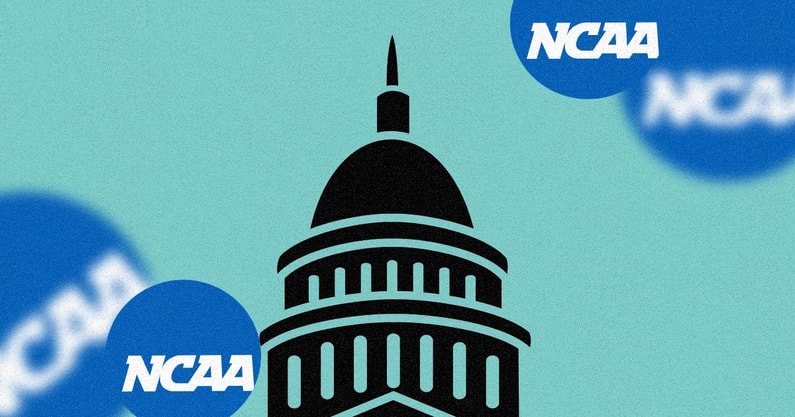U.S. Sen. Chris Murphy, Congresswoman Lori Trahan reintroduce bill that would regulate NIL market

U.S. Sen. Chris Murphy (D-CT) and Congresswoman Lori Trahan (D-MA) reintroduced a federal bill called the “College Athlete Economic Freedom Act” on Wednesday. If passed, the bill would allow international athletes to earn NIL compensation without jeopardizing their visa status.
The College Athlete Economic Freedom Act would also require schools and athletic associations to obtain a group license from athletes in order to use their NIL rights in any kind of promotion, notably including media rights deals.
Schools and athletic associations would be required to inform athletes how their NIL rights were used and how much revenue those group licensing deals generated.
The bill would also prevent NIL collectives and the institutions they support from discriminating based on gender, race or sport.
“Giving college athletes the ability to make money off their name, image, and likeness was long overdue, and the past two years have transformed college sports for the better,” Murphy said in a statement. “The NCAA spent decades arguing against athletes’ right to their own NIL, so it should come as no surprise that colleges and athletic associations are now focused on how to take back control, hoping Congress will do it for them. This legislation would enshrine unrestricted NIL rights into federal law and ensure athletes are treated fairly and start getting their fair share.”
Examining the NCAA’s aggressive push for federal NIL laws
It’s the latest in a wave of bills introduced prior to the August recess for Congress, including a bill that Sens. Tommy Tuberville (R-AL) and Joe Manchin (D-WV) released Tuesday, as well as another that Sen. Richard Blumenthal (D-CT), Sen. Cory Booker (D-NJ) and Sen. Jerry Moran (R-KS) drafted.
NCAA documents, which On3 obtained, outlined the association’s lobbying strategy. They noted the NCAA’s urgency in lobbying for a bill many of its stakeholders desire. The documents stated, “This is a critical window before political energy shifts toward the 2024 Presidential election.”
What else is in the NIL bill?
The College Athlete Economic Freedom Act would prohibit schools, conferences or the NCAA from restricting or colluding on college athletes’ earning potential through NIL deals, according to a press release. It would also protect athletes’ ability to retain representation, notably including through potential players’ associations.
If passed, the bill would provide “robust enforcement” if a school, conference or the NCAA restricts athletes’ NIL rights, according to the release. The enforcement could include civil action, allowing the Federal Trade Commission to issue “unfair or deceptive practice” penalties and “per se antitrust penalties.”
The bill would require collectives to “register with the Federal Trade Commission (FTC) and report the NIL deals they have facilitated so athletes and stakeholders asserting discrimination have all the information they need to address it,” according to the release.
Top 10
- 1Breaking
FSU Active Shooter
University sends out alert
- 2Hot
Chad Baker-Mazara
Auburn star entering portal
- 3
Lee Corso
Announces retirement
- 4
Bryce Underwood
Gifts car to security guard
- 5Trending
No Fake Injuries
NCAA changes rules
Get the On3 Top 10 to your inbox every morning
By clicking "Subscribe to Newsletter", I agree to On3's Privacy Notice, Terms, and use of my personal information described therein.
The bill would mandate institutional support for all athletes, as well as the commissioning of a report that would provide an analysis of the NIL market.
“The system of college sports is better for athletes today than it was two years ago,” Congresswoman Trahan said in a statement. “Rather than trying to turn back the clock, the College Athlete Economic Freedom Act addresses real issues in the current NIL landscape by strengthening athletes’ rights, addressing gender disparities in collectives, and closing the international athlete loophole. Congress should look forward – not backward – for policy solutions that prioritize athletes who have long been denied a voice in a billion-dollar industry built on their talent and hard work.”
Bill would support NIL efforts for international students
Murphy and Trahan’s bill also addresses a significant topic in the NIL landscape regarding the limitations on international athletes’ ability to earn compensation in the U.S. while on an F-1 visa.
If the bill is passed, international athletes would be able to enter into NIL deals “in the same ways their non-immigrant peers can without losing their F-1 visa status, including in the case that athletes become employees of their schools and/or athletic associations.”
In March, Murphy and Blumenthal, both of whom represent the state of Connecticut, issued a letter to U.S. Department of Homeland Security Secretary Alejandro Mayorkas to ask for guidance on updated regulations regarding international athletes’ ability to earn NIL income.
Both UConn‘s men’s and women’s basketball teams last season featured international athletes.